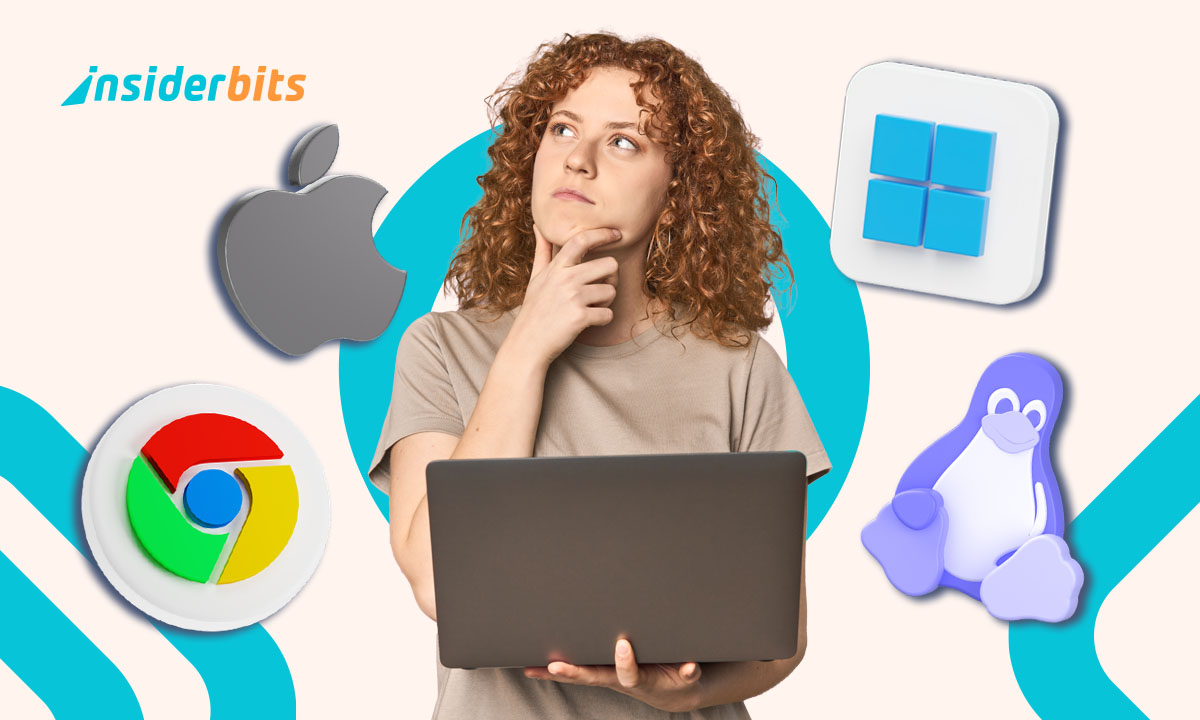Choosing the best operating system in 2025 depends on your needs—whether you’re a gamer, creative professional, student, or someone focused on speed and simplicity. Windows remains dominant in gaming and enterprise environments, while macOS excels in creative workflows. Linux attracts power users and developers for its flexibility, and ChromeOS is ideal for lightweight, web-based tasks.
Each system has evolved with new features, performance upgrades, and unique advantages in security, compatibility, and user experience. In this guide, we compare Windows, macOS, Linux, and ChromeOS side by side to help you decide which operating system best fits your lifestyle and daily tasks in 2025.
- Android Operating System Covers Every One of Your Needs
- Understanding Mobile Operating Systems
- Understanding the iOS Operating System
Which OS Is Best: Overview of Today’s Main Systems
The Best Operating System in the computing landscape in 2025? Well, each one has specialized strengths catering to different user needs.
Understanding these core platforms is essential for making an informed decision about your digital ecosystem.
Windows 11: The Universal Workhorse
Microsoft’s flagship OS continues its dominance with:
- Market Share: 72% of desktop computers worldwide;
- Key Strengths:
- Unparalleled gaming support (DirectX 12 Ultimate, Auto HDR);
- Broadest commercial software compatibility (Microsoft 365, AutoCAD);
- Excellent hardware diversity (from 200 laptops 10,000 workstations).
- 2025 Updates: AI-powered Copilot integration, improved Android app support.
macOS (Sonoma & Beyond): The Creative Powerhouse
Apple’s refined operating system shines with:
- Market Position: 16% global share, but 92% among creative professionals;
- Distinct Advantages:
- Metal 3 graphics engine for pro media workflows;
- Continuity features with iPhone/iPad (Universal Control, AirDrop);
- Industry-leading color accuracy and font rendering.
- 2025 Developments: deeper AI integration in Final Cut Pro/Logic Pro.
Linux: The Customizable Contender
The open-source alternative offers:
- Variants: over 600 active distributions (Ubuntu, Fedora, Mint most popular);
- Core Benefits:
- Complete environment control (kernel to GUI);
- Enterprise-grade security (used in 96% of servers);
- Free licensing with community support.
- Growing Appeal: steam Deck’s success boosting gaming compatibility;
ChromeOS: The Cloud-First Solution
Google’s lightweight platform provides:
- Education Dominance: 60% of US classroom devices;
- Key Features:
- Instant boot (under 3 seconds);
- Verified Boot security;
- Android/Linux app support.
- 2025 Enhancements: expanded offline functionality, better Windows app emulation.
According to PC Mag’s comprehensive comparison, the choice ultimately depends on three key factors:
Primary Use Case:
- Content creation: macOS;
- Gaming/office work: Windows;
- Development: Linux;
- Web-based tasks: ChromeOS.
Hardware Considerations:
- Windows runs on everything from tablets to servers;
- macOS limited to Apple’s premium hardware;
- Linux supports older devices that ChromeOS can’t run.
Ecosystem Integration:
- Apple users benefit from Handoff/Airdrop;
- Windows syncs with Android via Phone Link;
- ChromeOS ties into Google Workspace.
Emerging trends show growing convergence between these platforms, with Windows adding Linux subsystems, macOS gaining game porting toolkit, and ChromeOS expanding Android compatibility.
Yet each maintains its core identity, ensuring there’s no universal “best” choice—only the optimal system for specific user requirements.
Pros and Cons of Windows, macOS, Linux, and ChromeOS
So you can make a smart choice!
Windows 11
Pros:
- Largest software/game compatibility;
- Broad hardware support;
- Best for Office/enterprise use.
Cons:
- More vulnerable to malware;
- Can be bloated with pre-installed apps.
macOS
Pros:
- Optimized for Apple hardware;
- Best for video/photo editing;
- Strong security.
Cons:
- Limited hardware options;
- Expensive ecosystem.
Linux
Pros:
- Free and open-source;
- Highly secure and private;
- Ideal for developers.
Cons:
- Steeper learning curve;
- Fewer mainstream apps.
ChromeOS
Pros:
- Fast and lightweight;
- Great for web-based tasks;
- Affordable Chromebooks.
Cons:
- Limited offline functionality;
- Few native apps.
For managing files on Mac, see our Mac download manager guide.
What to Consider Based on Your Daily Use
| User Type | Best OS | Why? |
| Gamers | Windows | DirectX, Steam, and most AAA games |
| Designers | macOS | Optimized for Adobe Suite & Final Cut Pro |
| Developers | Linux | Full control, terminal access, Docker support |
| Students | ChromeOS | Cheap, long battery life, Google Workspace |
TechRadar suggests Linux for privacy-focused users.
Gaming, Work, Security, Budget: Which Wins?
When choosing an operating system, it’s essential to consider what matters most to you—gaming performance, productivity tools, security features, or overall cost.
Each platform shines in different areas, and the right choice depends on your priorities.
Gaming Performance: Windows Still Dominates
Windows remains the undisputed champion for gaming, due to:
- DirectX 12 Ultimate support for cutting-edge graphics;
- Steam/Epic Games library with over 50,000 Windows-compatible titles;
- DLSS/FSR technologies for boosted frame rates;
- Xbox Game Pass integration with PC.
Linux gaming improvements:
- Proton compatibility layer now runs ~80% of Steam games;
- AMD GPU performance nearly matches Windows;
- Still lags behind in anti-cheat support (e.g., Valorant, Fortnite).
Productivity & Work: macOS Leads for Professionals
Apple’s ecosystem excels for work because of:
- Continuity features (Handoff, Universal Clipboard);
- Final Cut Pro/Logic Pro exclusivity;
- Best-in-class trackpad gestures;
- Long-term update support (5-7 years per OS version).
Windows advantages:
- Broader enterprise software compatibility;
- Better multi-monitor management;
- Touchscreen/2-in-1 device support.
Security & Privacy: Linux Stands Strong
Linux maintains security superiority through:
- Open-source transparency;
- Granular permission controls;
- Minimal malware targeting (0.3% of attacks vs 83% on Windows);
- No telemetry/data collection.
macOS security notes:
- Gatekeeper and System Integrity Protection;
- Rapid security updates;
- Vulnerable to targeted spyware (Pegasus, etc.).
Budget Considerations: ChromeOS Delivers Value
ChromeOS dominates affordability with:
- 200−400 Chromebooks vs $1,000+ MacBooks;
- 10+ hour battery life;
- Automatic updates for 8+ years;
- Zero maintenance (no antivirus needed).
Hidden costs:
- Windows: Antivirus subscriptions;
- macOS: Premium hardware pricing;
- Linux: Potential training/time investment.
Enterprise/School Adoption Trends
As noted by Promevo:
- 72% of US schools now use Chromebooks;
- Windows dominates offices (75% market share);
- macOS growing in creative agencies (41% adoption);
- Linux powers 96% of top 1 million web servers.
Emerging alternatives:
- SteamOS for living room PCs;
- Asahi Linux for Apple Silicon;
- Windows 11 SE for education.
The optimal choice depends entirely on use case—while Windows wins for gaming, its security vulnerabilities make Linux preferable for sensitive work.
ChromeOS delivers unmatched value, but professional creatives will still prefer macOS. There’s no universal “best” OS, only the best fit for specific needs.
Final Verdict: There’s No One-Size-Fits-All
The best operating system varies by need:
- Windows for gaming and business;
- macOS for creatives and premium users;
- Linux for developers and privacy seekers;
- ChromeOS for budget and cloud-based tasks.
For alternative OS options, check TechRadar’s recommendations.





